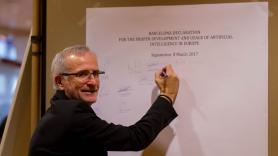There are many definitions of artificial intelligence out there, which hints at its slippery nature. One approximation would be: a computational system capable of emulating the functions of the human brain. Expressed in popular imagery as robots, in reality artificial intelligence goes much further and can already be found in many areas of our lives. Although there are some limitations, AI is in the selection of news articles we read, conditions or at least influences election results, is behind many of the ads we see and we are on the brink of co-existing with some of its new applications, like driverless cars.
But behind every opportunity there is also risk. To debate both sides, some of the top international experts in the field met for a B·Debate session, an initiative of Biocat and the “la Caixa” Foundation to promote scientific debate. This gathering led to the Barcelona Declaration for proper development and usage of artificial intelligence in Europe.
CONCLUSIONS:
- It is difficult to predict how our relationship with robots will evolve. This interaction opens up a new field known as robot ethics.
- Artificial intelligence applied to the massive amounts of data available today is creating echo chambers and filter bubbles on social media, threatening to radicalize ideologies.
- The algorithms artificial intelligence uses are often obscure. They must be translated into our language so that ethical, socially just decisions can be made.
- In light of the many opportunities and dangers, participants drafted the Barcelona Declaration for proper development and usage of artificial intelligence in Europe.



